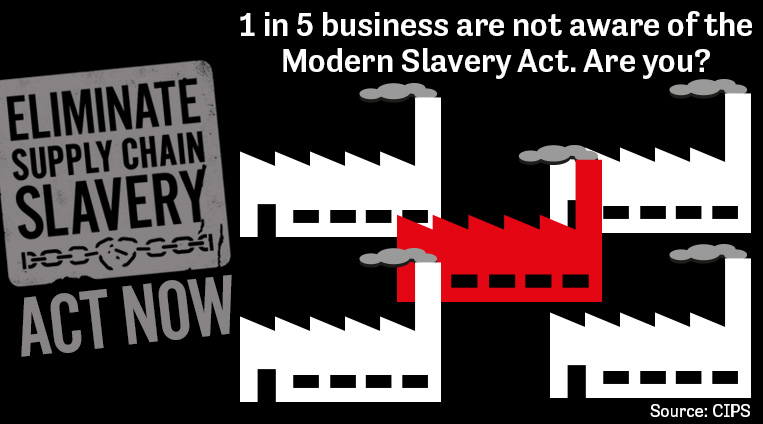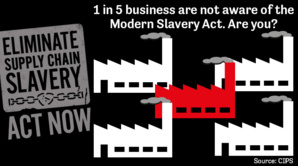Dailycsr.com – 22 January 2016 – The Chartered Institute of Procurement & Supply or the CIPS informs that the coming “new government rules” that will set in this spring has put the British businesses in the state of urgency for action as the new rules have been designed to wipe out “modern slavery in supply chains”.
In the coming fiscal year the businesses that have a turnover of over “£36m”, will have to present an annual report about the measures that they have taken to “ensure modern slavery is not taking place in their business or supply chains”. There are only little more than two months time left with the responsible managers of the supply chains for preparing themselves to comply with the new rules. However, CIPS maintains that the managers still remain “underprepared for compliance”.
Moreover, the managers for whom the new rules are applicable, forming the nineteen percent of the UK’s “supply chain managers”, appear to be “unaware of the requirements”, while another thirty eight percent of them are unsure as to when they will submit their “first modern slavery report”.
Furthermore, an additional forty percent of the managers have not read through the “government guidance”. Consequently, over one fourth of them, around twenty seven percent, confess that they are not fully clear as to “what their business is required to do”. Moreover, almost fifty two percent of the UK’s supply managers say that they have no idea as to what step should be taken even “if they did find modern slavery in their supply chain”.
The new rules form part of the “Modern Slavery Act” which was issued in the month of March 2015, whereby it strives to stop force labour in the United Kingdom’s economy. Therefore, the act encourages businesses to follow the “practices of their suppliers at home and abroad” with “greater interest”. Nevertheless, the impact of the Modern Slavery Act seems to be quite “limited” in its present conditions as it will only affect “a very small percentage of British businesses”. In the words of CIPS’ group C.E.O, David Noble:
“The Modern Slavery reporting requirement means that businesses can no longer afford to ignore slavery issues, morally and commercially. If they are unable to convincingly outline the steps they are taking to eradicate human exploitation from their supply chain, they risk damaging both their reputation and their bottom line.
“The Act means it’s no longer acceptable for businesses to ignore what they can’t see. It’s true that the modern supply chain is becoming longer and more complicated, but it is possible to take definite steps to put a process in place to achieve the level of transparency and traceability to ensure that their procurement practices do not contribute to modern slavery at any stage in their supply chains.
“Our findings suggest that good intent is not yet translating into action. With little motivation and no sanctions to speak of, this requirement rests on goodwill and general awareness. Consumers, communities and businesses deserve better.”
References:
http://www.ethicalperformance.com/
In the coming fiscal year the businesses that have a turnover of over “£36m”, will have to present an annual report about the measures that they have taken to “ensure modern slavery is not taking place in their business or supply chains”. There are only little more than two months time left with the responsible managers of the supply chains for preparing themselves to comply with the new rules. However, CIPS maintains that the managers still remain “underprepared for compliance”.
Moreover, the managers for whom the new rules are applicable, forming the nineteen percent of the UK’s “supply chain managers”, appear to be “unaware of the requirements”, while another thirty eight percent of them are unsure as to when they will submit their “first modern slavery report”.
Furthermore, an additional forty percent of the managers have not read through the “government guidance”. Consequently, over one fourth of them, around twenty seven percent, confess that they are not fully clear as to “what their business is required to do”. Moreover, almost fifty two percent of the UK’s supply managers say that they have no idea as to what step should be taken even “if they did find modern slavery in their supply chain”.
The new rules form part of the “Modern Slavery Act” which was issued in the month of March 2015, whereby it strives to stop force labour in the United Kingdom’s economy. Therefore, the act encourages businesses to follow the “practices of their suppliers at home and abroad” with “greater interest”. Nevertheless, the impact of the Modern Slavery Act seems to be quite “limited” in its present conditions as it will only affect “a very small percentage of British businesses”. In the words of CIPS’ group C.E.O, David Noble:
“The Modern Slavery reporting requirement means that businesses can no longer afford to ignore slavery issues, morally and commercially. If they are unable to convincingly outline the steps they are taking to eradicate human exploitation from their supply chain, they risk damaging both their reputation and their bottom line.
“The Act means it’s no longer acceptable for businesses to ignore what they can’t see. It’s true that the modern supply chain is becoming longer and more complicated, but it is possible to take definite steps to put a process in place to achieve the level of transparency and traceability to ensure that their procurement practices do not contribute to modern slavery at any stage in their supply chains.
“Our findings suggest that good intent is not yet translating into action. With little motivation and no sanctions to speak of, this requirement rests on goodwill and general awareness. Consumers, communities and businesses deserve better.”
References:
http://www.ethicalperformance.com/


 Modern Slavery Act Will Abolish Slavery From British Supply Chain
Modern Slavery Act Will Abolish Slavery From British Supply Chain





 Companies
Companies